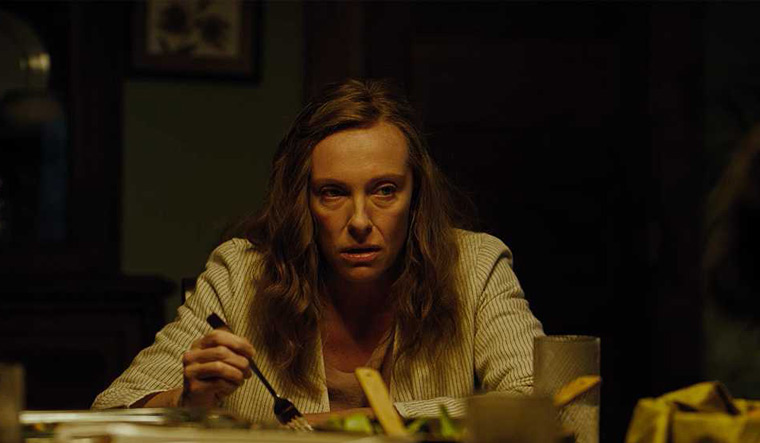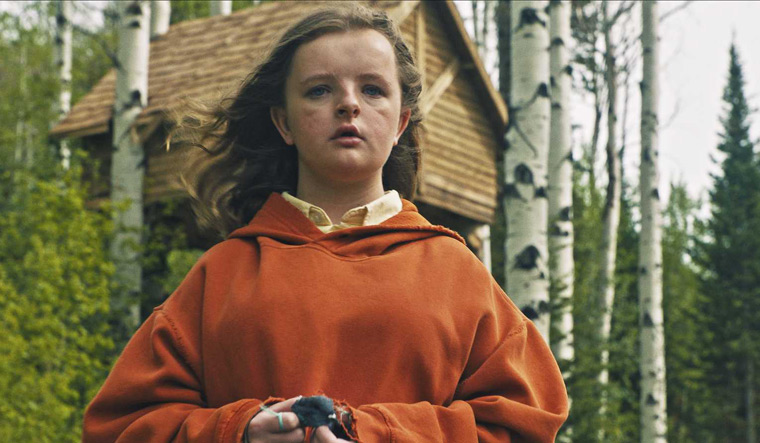In the age of instant meals, a slow-cooked delicacy feels exceptionally good. Ari Aster’s debut film, Hereditary, is like one of those painstakingly prepared meals that builds up on the same recipe and uses familiar ingredients, but attempts a process that adapts to the changing times and tastes. Much like the critically-acclaimed Get Out (2017) that evoked dread in a dysfunctional family of white people, Hereditary, too, plays out in a family of four who have their own set of problems to deal with.
The opening shot—a tree house captured through the window of a residence—is bright and positive, but melancholy is introduced almost immediately through Colin Stetson’s glum, but apt, musical score. Soon, the scene pans out to Annie Graham’s (Toni Collette) workshop. Annie is an artist who builds miniature replicas of spaces associated with her. The detailing that also includes figurines of her family members, is deep enough to introduce the audience to the other characters in the film.
At the very outset, Hereditary, puts us in the middle of a funeral. Annie has just lost her mother, Ellen. She describes her as a private and stubborn person who didn’t have a very easy relationship with her daughter. Yet, in the scenes that follow, the effect of her mother’s death, who spent the final years of her life in Annie’s house, unfolds in an unsettling manner. Her 13-year-old daughter, Charlie (Milly Shaprio), for instance, is not able to cope with the loss of a grandmother who promised to look after her forever. The child, who makes a weird sound (almost creeping you out) in moments of silence and sketches in her notepad, imagines her grandmother's presence around her. It builds anticipation of something creepy lurking around the corner, but nothing really happens. At least not for the initial one hour. It is just a slow build-up for the horror that is yet to be unleashed.

Annie’s husband Steve (Gabriel Byrne), also a shrink, is that balanced patriarch of the house who deals with the emotional upheaval the family is going through with utmost calmness. He introduces normalcy in a film that can swing to either side, until he too breaks down when their teenage son, Peter (Alex Wolff), gets deeply affected by the happenings around the household.
When the genre of a film is defined, as an audience, you often anticipate a customary flow. In this case, the film drives on belonging to the horror genre, thus invoking a fear throughout, but there's so much happening in there beyond what’s on the surface. It talks about the impending loneliness after a family member's death. There are restless nights, fear, hallucinations and the constant feeling of an ominous figure lurking somewhere around you. In such times, one often introspects about the damaged relationship with the deceased. In a desperate attempt to deal with all these feelings, Annie seeks help in a support group and talks about her relationship with Ellen which hardly had any scope for resurrection. In that process, she makes an unlikely friendship with an old woman, Joan (Ann Dowd). You know you are in for a surprise the moment you see Dowd (remember The Handmaid’s Tale), specially with her uncanny act.
Annie is jittery throughout the film, and Collette’s portrayal of this character is so fine that you sympathise with her. Shaprio’s performance keeps you on the edge of your seat. Her sketches introduce an element of dry humour in the film. However, it’s Wolff’s Peter that you would want to root for. A stoner with a troubled relationship with his mother, his life is the most at threat. Like Annie’s miniature artwork, her nightmares, too, are metaphoric, disclosing the many feelings of a mother who has probably dealt with a lot of emotions during her first pregnancy.
Dreams play an important role in defining the strange relationship Annie and Peter share, ultimately becoming one of the driving elements of the unnerving climactic scene.
Aster uses a lot of old tricks from the classics in the genre like Rosemary’s Baby or The Exorcist, like the existence of an evil spirit. But he never resorts to run-of-the-mill tricks of the genre like jumping to a shot to create unnecessary fear. With strong support from Pawel Pogorzelski’s slow-moving, never rushed camerawork, Aster creates situations that raise anticipation, at times distress too. He brings in elements of scriptures about the devil, occult practices and a corpse to induce fear, but nothing is in-your-face. He reveals everything at a pace that gives you ample time to soak it all in.
And like that one additional ingredient that gives a complete make-over to that timeless recipe from your grandmother's kitchen, it is his originality and the ability to closely dwell on human emotions, that stands out in this not-so-conventional horror film.
Film: Hereditary
Cast: Toni Collette, Milly Shaprio, Gabriel Byrne, Alex Wolff, Ann Dowd
Director: Ari Aster
Rating: 4/5


